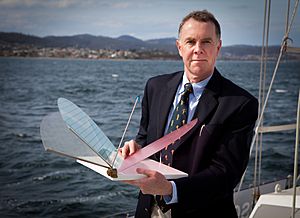Trevor McDougall facts for kids
Quick facts for kids
Trevor McDougall
|
|
|---|---|
 |
|
| Born |
Trevor John McDougall
1 July 1952 Adelaide, South Australia, Australia
|
| Education | Unley High School |
| Alma mater |
|
| Awards |
|
| Scientific career | |
| Fields |
|
| Institutions | University of New South Wales |
| Doctoral advisors | |
Trevor John McDougall is a famous Australian scientist who studies the ocean. He is a physical oceanographer, which means he looks at how the ocean moves and mixes. His work helps us understand how the ocean affects Earth's climate. He is a professor at the University of New South Wales in Sydney, Australia. He also used to be the president of a big international group called the International Association for the Physical Sciences of the Oceans (IAPSO).
Contents
Trevor McDougall's Education Journey
Trevor McDougall went to Unley High School in Adelaide, Australia. After high school, he studied Mechanical Engineering at the University of Adelaide and finished in 1973. He then went to the University of Cambridge in England, where he earned his PhD in 1978. A PhD is a very high university degree that shows you are an expert in your field.
Discoveries and Career in Ocean Science
After getting his PhD, Trevor McDougall came back to Australia. He worked at the Australian National University and then at CSIRO in Hobart, where he focused on ocean science. Since 2012, he has been a special professor of Ocean Physics at the University of New South Wales in Sydney.
How Oceans Affect Climate Change
Professor McDougall's research helps us understand how seawater mixes. This is super important for understanding climate change. The ocean and the air both help move heat from warm areas near the equator to cooler areas near the North and South Poles. His work shows how the ocean helps balance these temperatures, which makes Earth a good place for us to live.
Understanding Ocean Mixing
One of Professor McDougall's big achievements was creating a way to define "neutral density surfaces" with another scientist, David Jackett. Imagine the ocean has invisible layers. Along these layers, giant swirling ocean currents, called eddies, mix water. These eddies can be huge, from 10 to 500 kilometers wide, and can last for many months! Water mixes much, much faster along these special "density" layers than it does across them. Knowing how to accurately find and use these layers helps scientists create better computer models of the ocean. These models are key to predicting how the ocean will behave as our climate changes.
Professor McDougall also helped create new international rules for describing how seawater, humid air, and ice behave. These rules, called TEOS-10, are used by scientists all over the world.
Awards and Special Recognitions
Professor McDougall has received many important awards for his amazing work in ocean science. Here are some of them:
- He was chosen as a Fellow of the Royal Society in 2012. This is a very high honor for scientists in the United Kingdom.
- He also became a fellow of the Australian Academy of Science in 1997.
- In 2022, he received the Prime Minister's Prize for Science from Australia. This award recognized his discovery of four new ways the ocean mixes and his work on the properties of seawater.
- He was made a Companion of the Order of Australia in 2018. This is one of Australia's highest honors, given for his great service to science and education, especially in understanding ocean thermodynamics and climate science.
- In 2011, he received the Prince Albert I Medal from IAPSO for his outstanding contributions to ocean science.
- He also received the Anton Bruun Medal in 2009 and the A.G. Huntsman Award for Excellence in the Marine Sciences in 2005.
- In 2001, he was awarded the Centenary Medal for his service to Australian science.
- He received the Humboldt Prize from Germany in 1997.
 | Jackie Robinson |
 | Jack Johnson |
 | Althea Gibson |
 | Arthur Ashe |
 | Muhammad Ali |

